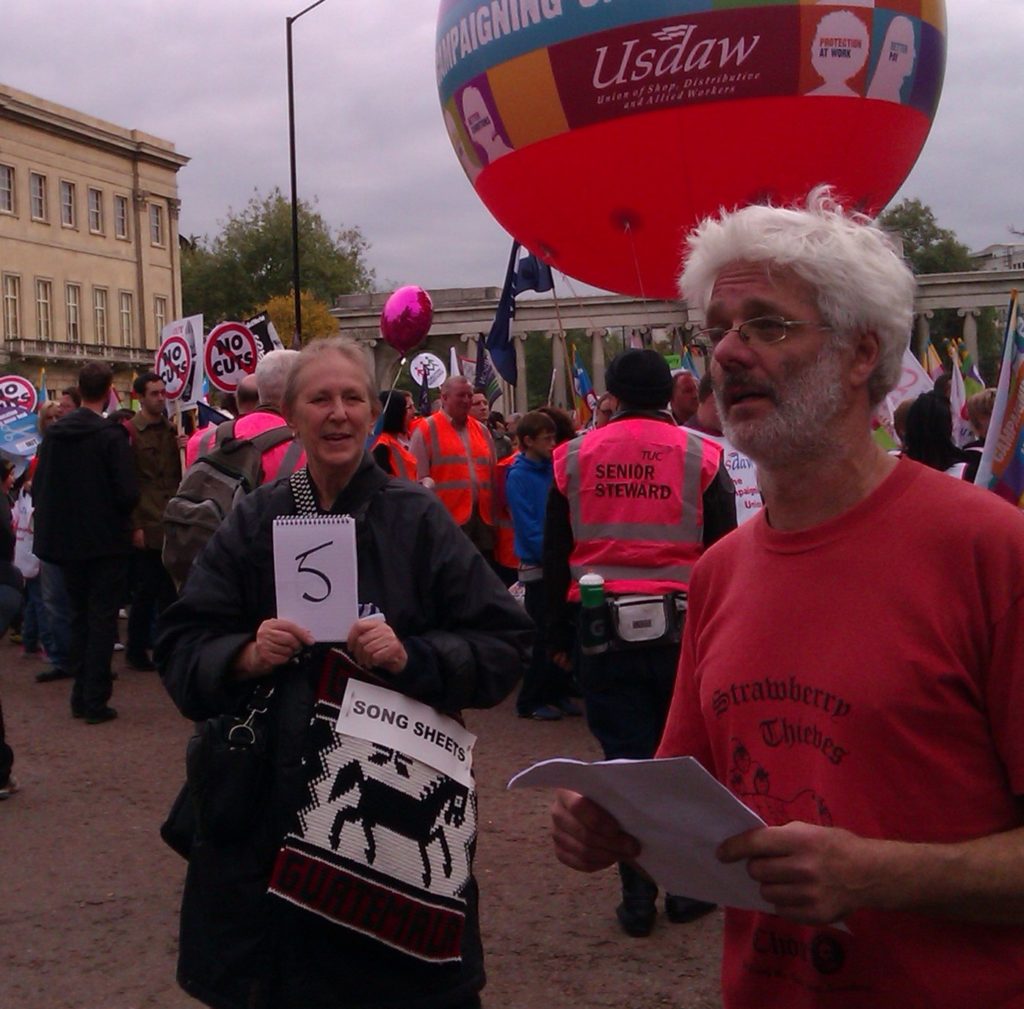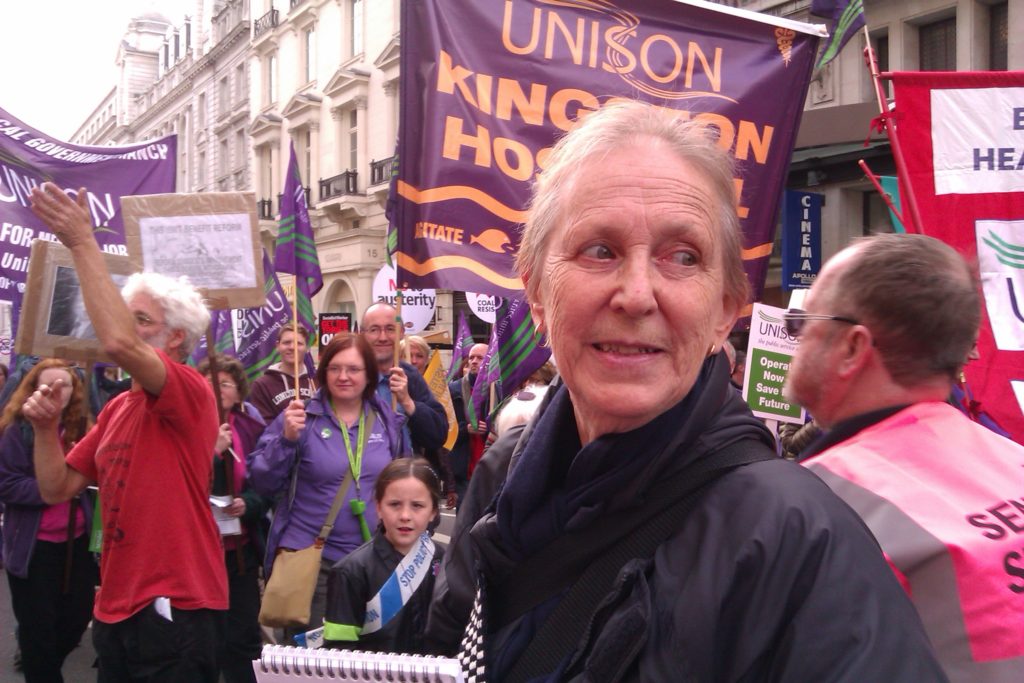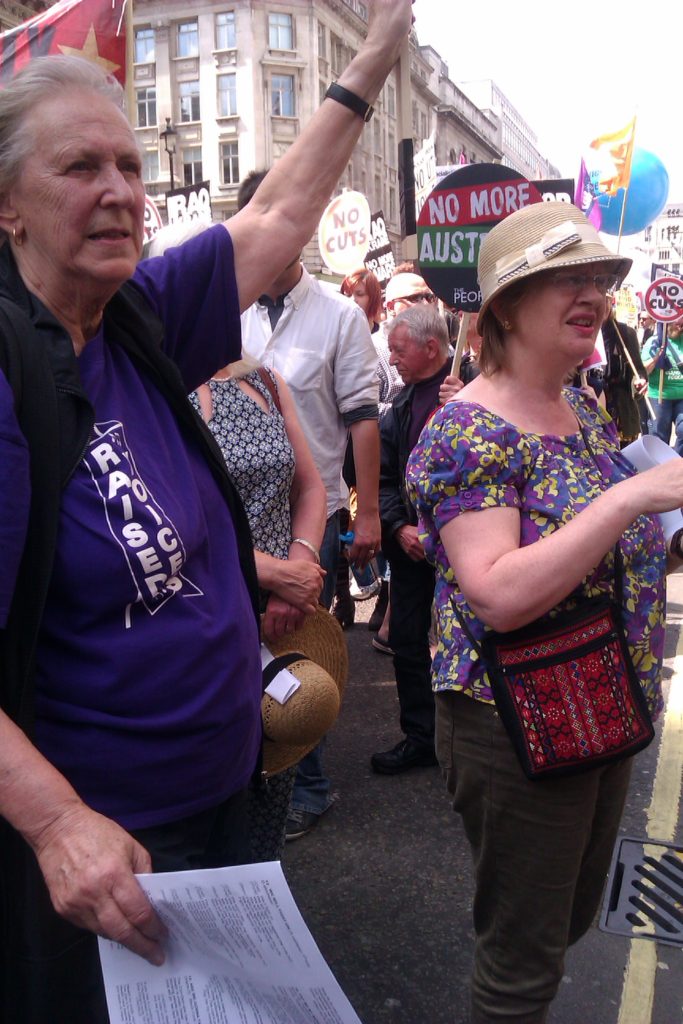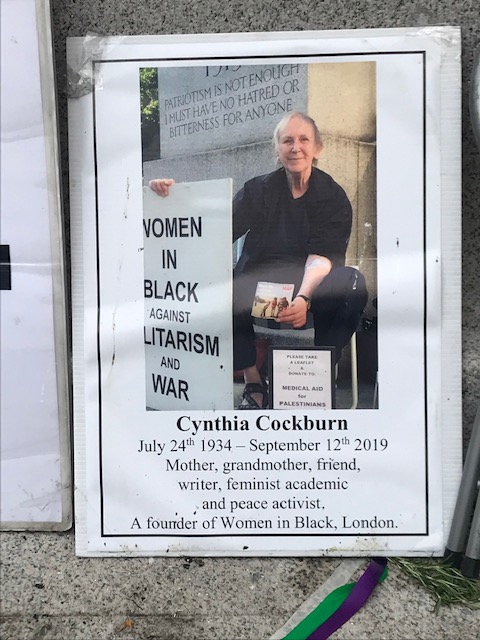
Cynthia Cockburn Memorial Event on 7th March 2020
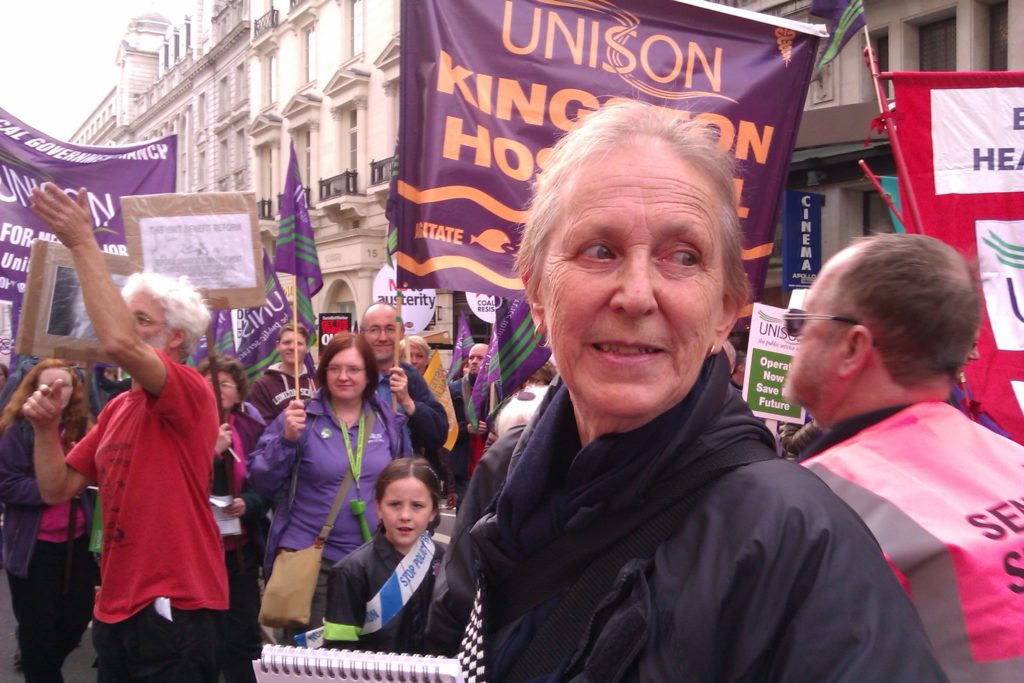
Rosemary Snelgar writes : ‘Raised Voices held our memorial to Cynthia on 7th March 2020, at which we performed some of Cynthia’s songs, and taught others of her songs and rounds to everyone there so that we could all sing them together. We were delighted that many of our past members, other singers, and Cynthia’s family and friends were able to join us. Everyone there enjoyed the memorial, and as a participant said “it was moving and fun and just lovely!”. Photos and videos of the event can be seen here.
We asked people to contribute to the costs of running the event, with any surplus being donated to one of the charities that Cynthia supported. From Raised Voices past and present members, other singers who attended, and from two other choirs, the costs were more than covered and we’re very pleased to say that we’ve sent £348.00 to Women for Refugee Women’.
Cynthia Cockburn’s One Song, One Dance is well-known to many choirs being simple, tuneful and with sentiments that are so appropriate and moving in the context of the current health crisis which knows no borders. The performance below is by Raised Voices and others at Cynthia’s Memorial. When Cynthia first introduced the song to the choir, written for the first climate demonstration in December 2005, she invited them to: ‘…stand, eyes closed, and visualize the world seen from outer space. The shining, blue-and-white, glassy sphere, supremely beautiful. Imagine all the earthly sounds we might hear if we listened carefully – the sighing of winds, breaking of waves, birdsong, animal cries, human voices in a thousand languages. One song. Imagine all the movement we might detect – cloud shadows shifting, tides heaving, rivers flowing, insects swarming, animals leaping, human beings in their millions going about their work and play. One dance. We saw so clearly how our world is one. One song, one dance, one world. How much it matters. And that now might be our one chance to save it.’
Appreciation
An appreciation from Morag Carmichael and Ros Brown of Raised Voices, with additional information from Caroline Poland and Claudi Cockburn.
Cynthia was born in rural Leicestershire and was expected to stay there and settle down with a nice Leicestershire man. Her parents had no notion that she should go to university, and so she did a typing course on leaving school. But a friend of her father’s offered to get her a job in London when she was 19. She became personal secretary to Anthony Eden and took dictations at his bedside when he became ill! When she was 79 Cynthia celebrated her birthday in a bigger way than usual with a picnic for friends and family on Parliament Hill, because she was so happy to have moved to London 60 years previously where she learnt about politics and joined the feminist movement. Cynthia was also married and, even though they separated after 13 years and later divorced, she remained friends with her ex-husband Charlie until his death. She had two daughters, Claudi and Jess, and three grand-daughters, Deni, Josie and Elsa Maria.
Cynthia joined Raised Voices in 1994, and quickly became very committed to the choir. She wrote our constitution and was a strong advocate of our being a collective. She took on the job of Membership Secretary for many years and went out of her way to make new members welcome. She had a way with words and wrote the lyrics for at least 20 of our songs. Who Do They Think They Are? written in anger around the time of the invasion of Iraq in 2003 is an especially powerful one, as are Arms Trader and Life on Earth. We also have many songs from Cynthia about Palestine and refugees, and a few humorous ones too. She loved our South African repertoire and several of her songs about Palestine are set to South African tunes, as well as One Song One Dance, which is now sung by many other choirs. It’s a firm favourite at Raised Voices. When Cynthia first wrote it she got us all to gather in a circle and close our eyes and imagine a world united, with everyone singing and dancing together.
When it seemed as if the hosts of the Street Choirs Festival were saying we had to be careful not to be too political, Cynthia wrote a humorous song to the tune of Bandiera Rossa called Not Exactly Revolution, which sent up Raised Voices and everyone involved, and went down very well with our hosts too. It was at this festival that the first meeting was called for those wanting to keep SCF political, from which Campaign Choirs developed. Cynthia was of course very much part of this. She remained strongly committed to Campaign Choirs and made friends with members of other choirs who shared this passion. She also went to great lengths to facilitate people from other political choirs to come to London and sing with Raised Voices on demonstrations. For instance, at the first anti-Trump demo there were 80 singers.
Back in the 70s Cynthia, together with other women, founded a Community Resource Centre at Union Place in Lambeth. A big focus of the Centre was community publishing, including teaching local people to use the various printing facilities. The centre became a hub of activities to empower people, including a community food co-op, a claimants’ union and pregnancy testing. In 1979 the National Front attempted to blow the place up, but without success. In the 80s Cynthia was part of a Greenham women’s support group and regularly visited the women’s camp there. It was Cynthia who took the iconic photo of women dancing on a silo when they broke in one night.
Cynthia is the author of many radical books. An early one, The Local State has been a seminal text for people working within local authorities. The Space Between Us is a study and search for solutions to the divisions between Jews and Arabs in Israel, Protestants and Catholics in Northern Ireland and those on all sides of the Bosnian conflict. She met with women from both or all sides in each conflict and facilitated discussions on building bridges between them. Cynthia founded Women in Black London, after visiting and speaking with the Jewish and Arab women in Israel who started the movement there. When writing The Line: Women, Partition and the Gender Order in Cyprus, Cynthia found that it was impossible for women from the two sides in Cyprus to meet, so she organised a conference for them in London. A great theme of much of her work was about masculinisation, how men are routinely brought up to be macho and inclined towards violence, and how this relates to war. Each of Cynthia’s books was a project in which she got personally involved to try and facilitate changes: she was an activist and campaigner as well as an academic (who never did go to university). Her latest book, Looking to London, is about women refugees in London from five different communities. She travelled around London finding three women from each community to meet and talk with. She was in her element when doing this kind of work.
Cynthia also became vice-president of the Women’s International League for Peace and Freedom in more recent years. Two of her books, From Where We Stand and Anti-militarism include inspiring accounts of aspects of WILPF’s history and its work today.
She had a wide interest in so many things in addition to her political involvement, and especially in all aspects of the natural world. Something that was very special for me was going on bird walks with her. She was so good at recognising their calls and songs, and pointing them out to us. I learnt a lot from her this way and have heard since that she could recognise the songs of over 100 birds. She had an amazing eye for detail and at different stages in her life had made studies of, for instance, the different species of grasses, and of trees, and would notice if a street tree was a variety she hadn’t come across before so that she could go back and look at it more closely when she had time. She took many beautiful photographs of trees which were displayed in a café local to her. She also had a great appreciation of the night sky, and knew how to locate the Andromeda galaxy with the naked eye, and would teach others of us how to find it too.
Cynthia’s commitment to the London Women in Black weekly vigil continued for as long as she was physically able to attend it, and she very often composed the letter to the Prime Minister and designed the placards. She designed placards for Raised Voices too, and continued to come to choir right through July this year, even though she had to leave half an hour early. The last time she sang with Raised Voices was at the Hiroshima commemoration on August 6th. We miss her hugely. She was a warm friend to so many people. A first reaction on hearing of her death was: “It’s hard to imagine a world without Cynthia”.
Tributes
Côr Gobaith, Canwyr Stryd Bangor Street Singers and Strawberry Thieves recorded One Song, One Dance, written by Cynthia, over the weekend of 27-29th September:
Sheffield Socialist Choir has also made a recording of One Song, One Dance in Cynthia’s memory:
Lotte Reimer (Côr Gobaith) writes:
I first met Cynthia at the Street Choirs Festival in Manchester in 2007. Member of newly formed Côr Gobaith, it was my first festival and I was blown away by the political choirs – the songs, the passion and the willingness, or rather urgency, to network and support each other. Cynthia personified all that for me and ever since that first meeting, she has been a real anchor for me in the street choirs. Cynthia was a major player in Campaign Choirs Network from the founding meeting in 2013, always with wise input, and willingness to organise and sharing organising skills, one example being her Big Event Organising guide. I love Cynthia for always being a part of a whole, to the point of getting really annoyed about being singled out for praise for organising the big sing, where she was so pleased to be part the group of organisers and felt no need for ‘glory’. She was also very supportive of the Singing for Our Lives: Stories From The Street Choirs project. It was very much driven by a desire to record voices like Cynthia’s for the activist community and the street choirs, and her interview for the book was brilliant. It was also characteristic that she made her home available for all the Raised Voices interviews.
Two years ago, on the 14th October, I went to London for Cynthia’s launch of her book Looking To London. Much more than a book launch, it was a celebration of her life’s work, attended by academics, campaigners and activists. I realised then how much I didn’t know about her and I was completely humbled by all the women who spoke of working with her and their testimony to the way she understood problems and worked to resolve them, the relationships she formed and the deep respect she showed everybody she came into contact with. Feminist and lifelong peace activist, she was at Greenham Common, she formed Women against War in the Gulf in 1981, a group that developed into a watchdog during the war in former Yugoslavia and later affiliated to Women in Black, she travelled round war torn areas and listened to survivors’ stories and dreams and she was instrumental in gathering 800 women from across the world in Jerusalem to discuss resistance against the occupation. Her feminist peace and conflict research has informed politicians and decisionmakers and her books are used as text books in universities the world over. She founded Women in Black London, and was working on a book on Women in Black against War to record the organisation’s more than 30 years of history – unfinished whe she died. Nadje Al-Ali’s obituary in the Guardian gives more information about the Cynthia whom we campaigning choristers, perhaps, knew less of: https://www.theguardian.com/world/2019/sep/24/cynthia-cockburn-obituary
Inspirational, courageous, warm, inclusive, clever…I could fill a book with Cynthia adjectives. I feel so rich that I have known her and so sad that I won’t see her warm, beaming face and hear her thoughtful, wise and compassionate voice again.
Chris Green (Calder Valley Voices and founder, White Ribbon Campaign UK) writes:
I usually met her once a year at Street Choirs but she would always ask about the progress of White Ribbon UK’s work on Challenging Male violence against women and offer suggestions – I will miss her.
Gallery
